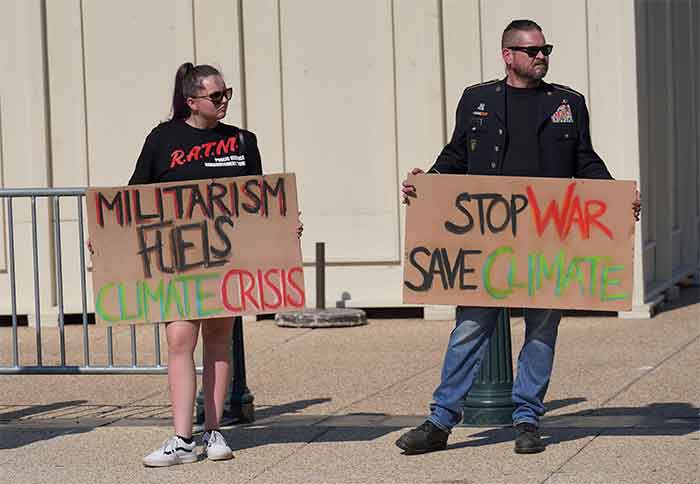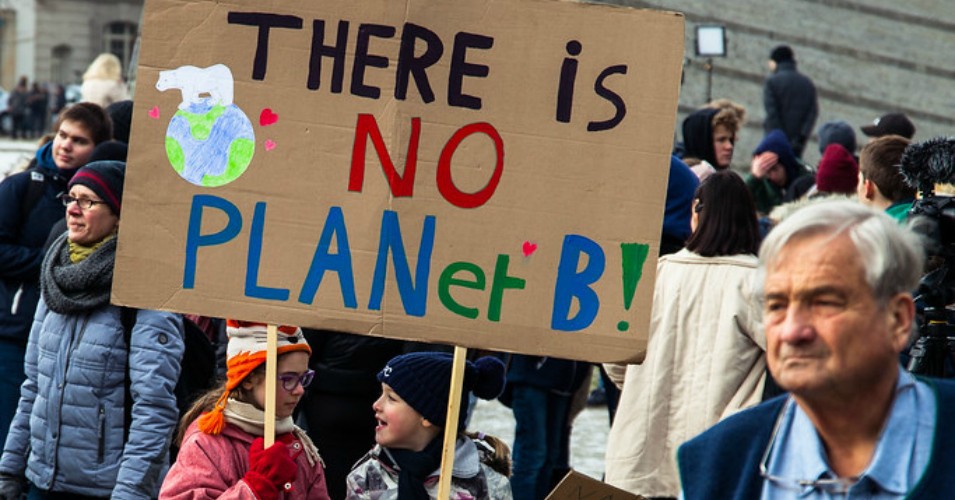
Can organizations sincerely say they are leading the climate justice fight without also being unapologetically antiwar? Short answer – no. Here’s why.
We cannot end climate change without ending war. The United States military is the planet’s largest single emitter of greenhouse gasses and consumer of oil. The US military and its weapons, consistently deployed to secure economic dominance for the few while ensuring suffering for the many, has no place on a just and livable planet. The corporate interests and fascist, militarist tendencies that lead humanity into conflict are the very same that view our Earth, its atmosphere, and its abundant life as a resource to be exploited for profit. Ending war means ending the war economy – the colonial system of extraction and exploitation that got us into this mess in the first place.
That a more peaceful world could be a result of the broad system change climate activists are calling for is no coincidence. But the theoretical intersection alone isn’t enough! Environmentalists and climate change activists must make a commitment to peace explicitly. Our planet depends on it.
There are already plenty of reasons to oppose war such as the threat of nuclear destruction, massive civilian casualties, and violence against women and the concentration of fascist imperialist powers into corporatized hands. But if that is not enough for folks doing important work in climate justice to also oppose all wars, then let’s also consider – militarism and the war economy.
The Pentagon is already the planet’s largest single institutional emitter of fossil fuels, and US-backed conflicts around the world since WWII can always be tied back to economic gain dominance, especially via the private control of fuel and natural resources. A war with China, which the US has gradually encircled with hundreds of military bases and weaponry, is being provoked for economic reasons as the government and media manufacture the consent of the American public. This will only result in the increase of Pentagon funding (already at $858 billion), siphoning off billions of dollars of taxpayer money to infrastructure and weaponry which is destroying our climate.
Many people don’t realize that every solution to climate change already exists. The problem is the government simply will not fund it while its priority is war. Demilitarization is one of the most important things we can do for the climate, and for living beings inside and outside conflict zones.
Currently, our measure of success as a country is based on how much we can destroy and exploit. While the basic tenets of capitalism are taught in America as economic law, this is hardly the case.The economic system we operate under is a choice. There are other options. Our broken and optional system –where income inequality is at an all-time high, the poor have little access to healthcare, and the climate is nearing deadly tipping points – is driven by capitalists and federal economists who love to talk about the profit-oriented metric Gross Domestic Product, or GDP. This metric, which is used as an indicator of our country’s well-being, tells us the amount of financial profit produced by economic activity in a given time period. Which is pretty ridiculous when well-being is obviously a function of things that aren’t liquid cash, like quality of education, healthcare, and biodiversity.
Essentially, under a GDP-oriented economy, half of a country’s forest cover could be destroyed and the poverty rate in all major cities could double over the course of a year, but as long as billionaires continue to increase their profits, the illusion of progress persists. But if we manage to change how we measure progress in this country, we may actually be able to achieve some. Genuine Progress Indicator is a metric which places value on things like improving air quality and food security. With GPI in place, lawmakers and activists would have the most undeniable picture yet of the cost of war on people and planet
And what is the cost of war to the environment? Take the current Russian invasion of Ukraine. Russia’s invasion of Ukraine has led to massive death and displacement, as well as environmental damage with exponential increases in greenhouse gas emissions from rocket attacks and explosions. Attacks on infrastructure–railways, electrical grids, apartment buildings, oil depots–have led to hollowed-out cities blanketed by charred rubble and toxic munitions.
Additionally, the sabotage of the underwater Nord Stream pipelines supplying Russian gas to Germany led to the release of 300,000 tons of methane gas into the atmosphere, similar to the annual emissions of a million cars. According to the UN Environmental Programme, it was the largest release of methane gas emissions ever recorded.
The shelling of Ukraine’s nuclear power plants, particularly the Zaporizhzhia plant, has increased fears of an explosion that would spread radiation throughout Ukraine and beyond.
As the fighting has now gone on for a year with no end in sight, Ukraine braces itself for further disruption of local ecosystems, forest fires, blackened trees, air pollution, sewage leaks and chemical contamination of rivers and groundwater in Ukraine.
Meanwhile, Russia’s invasion of Ukraine has mutated the global fuel market, with Russian cuts of fuel exports and Western sanctions leading many European countries to resume filthy coal-fired power generation. US companies have also consolidated money and power as a result, dramatically increasing their exports of natural gas to Europe. These exorbitant profits will fuel the fossil fuel economy for years to come.
Funding endless war is an existential threat to human life and one of the leading causes of climate change. In order to achieve climate justice and secure a sustainable future, climate and environmental groups must adopt an antiwar position for people and the planet. To defend Earth, we must end wars.
Teddy Ogborn is an activist and organizer based in New York City with a BA in Comparative Literature from Haverford College. They have several years of experience in documentary storytelling, strategic organizing, and direct action, particularly with climate actions in New York and New Jersey. Teddy is CODEPINK’s War Is Not Green (WING) Coordinator where they focus on the intersection of militarism and climate change.














































